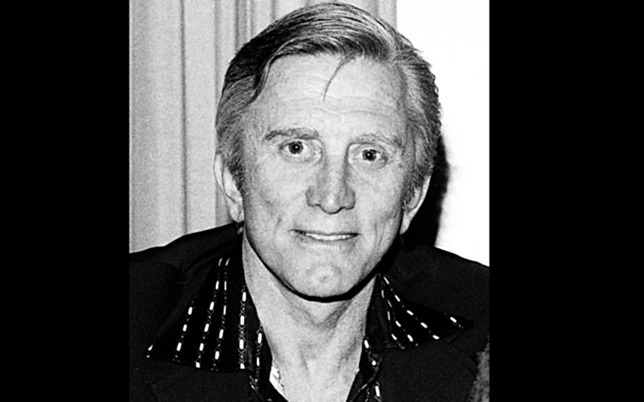
- Industry
Kirk Douglas
Issur Danielovitch was born in Amsterdam, New York, on December 9, 1916, to Russian Jewish immigrant parents, the only boy in a poor family of six sisters. He grew up as Izzy Demsky and received a loan to attend St. Lawrence University, where he joined the wrestling team, then was accepted on a scholarship at the American Academy of Dramatic Arts. He legally changed his name to Kirk Douglas in 1941 before joining the Navy. His ambition was to make it as a theater actor on Broadway, not a major movie star in Hollywood. It was his drama school friend Lauren “Betty” Bacall who put in a good word for him with producer Hal Wallis, and he was cast in his first movie The Strange Love of Martha Ivers (1946) as Barbara Stanwick’s husband. By then he was married to another acting classmate, Diana from Bermuda, and had a son, Michael, born in 1944; they had another son, Joel in 1947, before divorcing in 1951. Douglas would act opposite Lauren Bacall in Young Man with a Horn (1950) by Michael Curtiz, the story of jazz trumpeter Bix Beiderbecke.
Kirk Douglas played a gangster in Out of the Past (1947) with Robert Mitchum, a heartless boxer in Champion (1949), a cynical reporter in Ace in the Hole (1951) by Billy Wilder, an inflexible policeman in Detective Story (1951) by William Wyler, a movie producer in The Bad and The Beautiful (1952) by Vincent Minnelli with Lana Turner, painter Vincent van Gogh in Lust for Life (1956) also by Minnelli, building up his image as a tough angry guy. He said to journalists of the Hollywood Foreign Press in 1978, “I’d played a schoolteacher in Letter to Three Wives (1949 by Joseph Mankiewicz). Suddenly I did Champion and nobody would let me play a weak character anymore, I became the tough guy. But to me every movie is an adventure; it takes me into the life of a different character and very often to a foreign land. I’ve shot movies in Israel, England, Norway, Germany, Austria, France, Italy. So I’ve really been lucky.” His college training as a wrestler helped him.
He said to HFPA, “To me vitality and energy is tied up with acting. I approach a picture like an athlete does a sporting event; I stop drinking, I watch my diet, I exercise. When you think of the movies that I have done, quite a few have been physical workouts that demanded that I keep in shape, so if you’re not physically fit for it, it’s difficult. I tell my sons that the first thing you need in a profession like ours is health, because it takes tremendous energy.”
Wanting more control over his projects, in 1954 Douglas started his own company, Bryna Production, named after his mother. He said to HFPA: “When I came to Hollywood, I was a maverick, I never belonged to a studio. I envied those young actors that were signed to a studio, because, even though they complained about it, they met pretty girls, they took dancing and singing lessons, they had people looking after them, they belonged to a group and there was a camaraderie. I was always a loner, an outsider, which isn’t so pleasant.” He produced and starred in true classics like Paths of Glory (1957) directed by Stanley Kubrick about the horrors of war, Spartacus (1960) also directed by Kubrick, where he dared giving on-screen credit to blacklisted screenwriter Dalton Trumbo, the western Lonely Are the Brave (1962) also written by Trumbo, his favorite film, the political thriller Seven Days in May (1964) by John Frankenheimer with Burt Lancaster. He said to HFPA “You don’t make a movie to try to educate people, but to entertain. If people turn on the TV or go to a movie theater, they want to forget all their problems for a couple of hours, but nevertheless it’s possible to make a movie that does that and, yet, deals with important ideas.” Douglas made 7 films with his friend Burt Lancaster, including the classic western Gunfight at the O.K. Corral (1957) by John Sturges about Wyatt Earp and Doc Holliday. He worked with the best directors, “some giants” as he calls them. Besides Mankiewicz, Kubrick, Wilder, Minnelli and Wyler already mentioned, he made The Big Sky (1952) by Howard Hawks and The Arrangement (1969) by Elia Kazan.
Later in life Douglas reinvented himself an author, writing his autobiography, A Ragman’s Son, published in 1988. He said to HFPA: “To me the book was a voyage of discovery in which I came to grips with myself, it was a wonderful adventure and a cathartic experience. It’s a great idea for everybody to write their autobiography, whether it’s published or not, it would save you thousands of dollars on a psychiatrist couch.”
Douglas, who had two more sons, Peter and Eric, with his second wife Anne, declared “I’ve said to my four boys that I had the advantage of coming from abject poverty, so I had nowhere to go but up. Whereas my kids have seen movie stars all their life, like a Frank Sinatra or a Burt Lancaster driving up in a Rolls Royce.” He’s still active now in his 90s, after surviving a plane crash and recovering from a stroke that affected his speech in 1996, and he has not lost his sense of humor; in 2007 he wrote a book titled My Stroke of Luck. Kirk Douglas was honored by the Hollywood Foreign Press with a Golden Globe as Best Actor for Lust For Life in 1957, with the Cecil B deMille award in 1968, and with 2 nominations, for Detective Story in 1952 and for Amos (1986-TV).